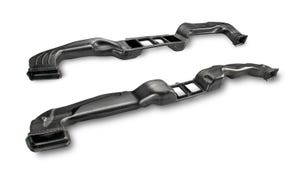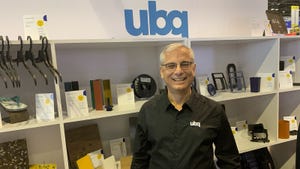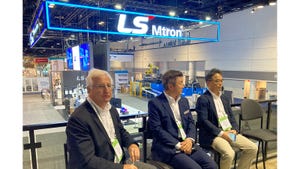Productivity
April 1, 1997
Suwandi Dhanu, general manager,believes |
Back in the late 1970s, Fuji Photo Film Co. Ltd. was a small company.In 1979, Otje Honoris (1922-1981) started a small company of his own inJakarta, as Fuji's sales agent. Fuji saw a tremendous opportunity for growthin Indonesia, the Southeast Asian marketplace, and around the world, butwas faced with high import duties for manufacturing its products in Japanand exporting them overseas. The import duties were in the neighbourhoodof 30 percent in Indonesia alone. Such duties would be only around 5 percentif Fuji manufactured in Indonesia.
Fortunately, Honoris had experience in injection moulding. He workedfor nine years with a multinational captive moulding operation. No oneelse in his company knew moulding. Still, a unique cooperative relationshipwas formed. Honoris began moulding film spools for Fuji in a small plantwith 79 employees and four moulding machines.
His company, known today as PT Honoris Industry, became independentin 1982 and manufactured Fuji's first camera, the M-1. Today, Fuji's marketshare is around 85 percent, just in Southeast Asia. Today, Honoris' companydoes 100 percent of Fuji's precision custom moulding and contract manufacturingin two plants in Indonesia totaling 70,000 sq m, with 2,600 employees and56 moulding machines.
Pt Honoris must hold and maintainmoulds for |
There are more than 60 plastic components in a single Fuji camera. Thecompany presently manufactures nine camera models involving 540 activemoulds. Three years ago, PT Honoris Industry branched out into new marketswith new customersÑmaking car stereos for Japan's Pioneer. The companyoversees a very large number of employees, running several very sophisticatedpieces of equipment, yet ships millions of parts, just-in-time, that exceedcustomer quality expectations. How? You may be as surprised as Fuji originallywas when you find out. Join us on our tour of the PT Honoris Industry inCiawi, West Java.
A One-stop Shop
About two hours north of Jakarta in the Bogor, Jawa Barat area, theCiawi factory is found up a winding mountain road behind an impressivegate with uniformed guards that salute you as you drive through.
All 56 moulding machines atthe Ciawi Factory |
The factory grounds look and feel like a small university campus. Beforetouring the manufacturing areas, you must exchange your shoes for slippersand put on cleanroom garments. The manufacturing environment is tightlycontrolled for quality's sake and steady-state machine performance, andproduction is monitored and controlled by computers.
The first thing that comes to mind when you enter the moulding areais, "Where is everyone?" Then you notice the parts-removal robotson every machine, the centralized materials handling system, and the partsconveyors. PT Honoris Industry is highly automated. Every machine is equippedwith either a Harmo pneumatic parts-removal robot or a Harmo sprue picker.Materials handling systems and dryers are from TEW and Matsui. Also, thecompany has designed and built its own automation peripherals. Standardizationis a company policy. Resins primarily are from Japanese suppliers, suchas Toray, Mitsubishi, and Teijin.
The area in which camera bodies, camera components, and other partsare moulded is well-lit, air-conditioned, and immaculate. Thirty Nisseimachines are arranged perpendicular to the wall with injection units facingthe aisle. Robots remove the parts and place them on inclined conveyorsfeeding QC inspection and packaging stations. Typically, production caninvolve some six mould changes per day.
Optical inspection of mouldedlenses takes place |
This room with its larger machines is impressive, but PT Honoris Industry'slens moulding room is state of the art. Here, top-of-the-line Sumi-tomopresses are used. Machine utilities and materials handling tubes are overhead.Though the machines are arranged in the same orientation as in the otherrooms, there are differences.On some lines, the company has installed intravenous-likebags, the sort you might find in an operating room, to ensure that eventhe surfaces of the conveyors are kept clean with regular drops of water.Opticalinspection systems with visual aids are on the floor of the moulding areato make absolutely certain all lenses moulded are to within specification.
So, where are all the people? Injection moulding is only one of fourdivisions at the Ciawi factory. Its optical division is equipped with curvegenerating, polishing, measuring, coating, and assembling stations forglass lens manufacturing. Its electronics division for cameras and carstereos is equipped with the latest chip mounting, wave soldering, andcalibration systems, and has solder paste printing, inspection, and manualassembly teams. However, the majority of its work force is in its cameraassembly division.
QCDSM
Credit for success has to go to the company's management style, describedwith an acronym: QCDSM. This stands for quality, cost, delivery, safety,and morale.
PMMA camera lenses (above) with.5 to .3 pitch |
Regarding quality, the company says, "We are strict to customerspecifications." Yet customers often are surprised to get more thanwhat they were expecting. Lenses with pitches ranging from .5 to .3 mmare moulded, perfectly. In general, part tolerances throughout the factoryare maintained to within ±30 mm. "Fuji asked for a standardreject passing rate of 98 percent. We achieved 99.2 percent," thecompany says.
Indonesia enjoys an attractive economic profile as a low-cost areaof the global marketplace. Labour costs are relatively low ? minimumwage is about 165 rupiahs/month (US$ 3.00/day). But PT Honoris Industryputs more faith in continuous productivity improvement as a more reliablemeans of controlling cost. The company lives by this phrase: Good is nogood, if better is expected. "We have formal programs in place thatwe've put together with our ISO and Kaizen teams to control our costs."
Production control and low-reject moulding help PT Honoris Industrymeet its customers' just-in-time delivery schedules. "We maintainzero inventory of finished product. Our inventory is only in parts,"the company maintains. And regarding safety: "We care. We have a verylow accident rate." It also cares about the morale of its most preciousresource, and the real key to its success ? its workers. The resultsare impressive. With 2,600 employees, employee turnover is less than 1percent.
"In 1989, we realized that the company would be experiencing veryrapid growth," says Suwandi Dhanu. "Our technically trained engineerswere well prepared, but the assembly line workers, that was different.If you have 300 operators, you have 300 different characters. You haveto standardize, you have to minimize differences to make a production linework," he explains. PT Honoris Industry sees to it that new employeeslearn more than the technical aspects of their jobs. Employees are taughtgood work habits and good work ethics through incentives, and through anenlightened management style. He believes that a willingness to work isas important as an ability to work.
Most PT Honoris employees workin assembly. |
"We always say, as managers, an employee is not the inferior ?an employee is like a younger brother or sister. We all are very closeto our operation. We work very hard to instill positive thinking amongall the employees, and to eliminate blaming." It works. "Theirmothers and fathers have come in and have asked, 'How did you do this?'They bring the good work habits they learn here back home, and everyonesees the results."
PT Honoris Industry has plans for expansion in Indonesia. It also plansto work hard to maintain its unique working relationship with Fuji, whilestriking new partnerships with new customers. Through partnerships withits employees, the company feels it can continuously improve productivitywhile continuing to surprise everyone with its success.
You May Also Like



